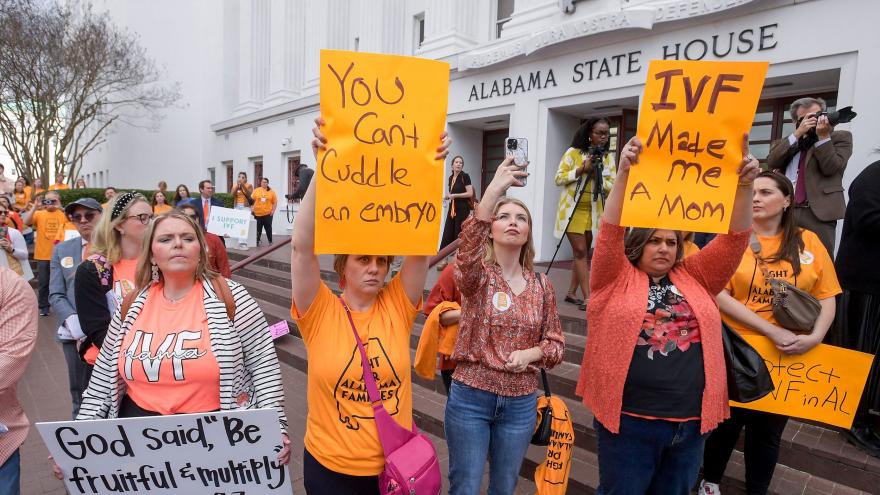
Lawmakers in Washington left In-Vitro Fertilization (IVF) regulations up to the states, leading to controversy on defining life.
In Florida, House Bill 651, originally filed by Jenna Persons-Mulicka, died in its second calendar reading during the 2024 legislative session.
The bill sought to revise the definition of the term “survivors” to include parents of an unborn child while providing a definition for the term “unborn child.” It also sought to prohibit the right of action against a mother for wrongful death of an unborn child, and it would have authorized parents of unborn children to recover certain damages, according to the Florida House of Representatives.
This means that the bill would have allowed civil lawsuits for damages against health care practitioners providing abortion care. It could have also impacted the friends and family members who supported a pregnant person’s efforts to obtain the medical care they needed. Additionally, it would allow any individual who impregnated another person to sue for the wrongful death of a fetus, according to ACLU Florida.
Democrats feared that if any further additions to HB 651 would have been made, it would have opened up the possibility of fetuses being considered persons in civil liability cases.
The term “personhood” was first used in the landmark Roe v. Wade case in 1973, in which the U.S. Supreme Court struck down a Texas statute banning abortion, effectively legalizing the procedure across the United States. The court held that a woman’s right to an abortion was implicit in the right to privacy protected by the 14th Amendment to the Constitution.
If fetuses were to be considered persons, it would allow for state law to openly interpret the meaning, therefore potentially banning abortion. Though this bill did not become law, it affected the well-being of clinics and doctors who perform procedures such as abortions and In-Vitro Fertilization.
Due to this reasoning, HB 651 came to a halt midway through the legislative session when the Alabama Supreme Court ruled that frozen embryos are children. It led to “legal liabilities and concerns about the future of In-Vitro Fertilization,” according to Tampa Bay News 9.
According to Johns Hopkins’ medical school, the In-Vitro Fertilization process “removes eggs from the ovaries, fertilizes them to create embryos, lets them grow for several days and then freezes them.
When thawed, the fertilized eggs — embryos — can be implanted either in the patient or in another person.
Coyote Chronicle stated that “while egg retrieval can still occur, fertilization, embryo development, and implantation are on hold.
The Alabama court’s unprecedented decision disrupts established medical practices and reignites debates about the legal definition of life. The court’s ruling stemmed from a 2020 incident where frozen embryos were destroyed.
Citing anti-abortion language, Chief Justice Parker declared embryos “unborn children” with legal protections. This not only challenges medical protocols but also sets a complex legal precedent beyond fertility treatments.
This process is the only option for patients who struggle with certain medical issues, yet after this ruling in Alabama, many clinics offering IVF in Florida paused their services to patients out of fear of the ruling.
Several fertility clinics in the state have stopped services and patients are rushing to ship their embryos elsewhere. Many voters see the court’s decision as a consequence of the overturning of Roe v. Wade, which has empowered far-right lawmakers to push for legislation that declares life begins at conception, according to The Cut New York.
In a statement from bill Sponsor Erin Grall, R-Vero Beach, she said, “I have requested that (SB 476) be temporarily postponed at this time. It is my understanding this is the first time this issue has been considered by the Florida Legislature. Although I have worked diligently to respond to questions and concerns, I understand there is still work that needs to be done. It is important we get the policy right with an issue of this significance.”
The Reproductive Medicine Group, a fertility clinic located in the greater Tampa Bay area, reported that “It very much places couples and individuals in limbo, and these groups of individuals very desperately want to have children.”
Dr. Sandy B. Goodman with the Reproductive Medicine Group told The Tampa Bay Times, “We cannot go on a slippery slope of saying what is the potential and what is the actual. We’re taking away the opportunity for couples to have life because we’re incorrectly defining what the sperm and egg is, which is again completely a potential for life.”
Since this bill died, tensions have continued to rise in Alabama during its special election. The Washington Post reported, “The first electoral showdown between a Democrat and a Republican in the state since Alabama’s Supreme Court ruled in February that frozen embryos created for IVF are people — reflects how the two parties are navigating a heated debate over reproductive issues in competitive races.”